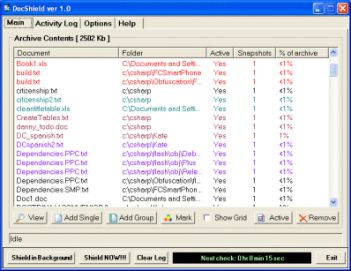
or remedy the catastrophic loss or accidental modification of important electronic documents. It
protects these documents by continually monitoring them for changes, then creating and storing
snapshots of those documents as they change through time. DocShield's operation can be described as "passive" because it will never delete nor modify your shielded documents. "Snapshots" are stored in
a compressed archive, which DocShield can be configured to keep in more than one location for
added protection. Versions of the document throughout its history are accessible to view or
restore. The archive of shielded files may exist on a local disk, a network disk, or other storage
devices. For DocShield to begin shielding documents from disaster, you must first select one or
more "destination" folders, which will hold the DocShield archives. If your resources allow, it is
suggested that you create at least two destination folders on different physical devices to
protect against hardware failure. You then select the documents that you want to shield. When
a new "snapshot" of a document is written to an archive, it will automatically be written to the
archive in each of the destination folders.
You can specify how often you want DocShield to check on the documents, to see if any of them
need to have a "snapshot" taken This time interval may be anywhere from every second to every
few days. You can also specify if you want DocShield to be loaded automatically, every time you turn
on your computer. If you delete a shielded file, it's snapshots will continue to exist in the
DocShield archive(s) until you specifically remove them. DocShield works in the background
and consumes negligible computer resources as it goes about averting potential catastrophic
document loss. You can fine tune almost everything in DocShield.
Program Informations
Developer PanIO Systems
Price And Size
1MB Demo; $39.00 to buyDate Add
September 22, 2010
Download